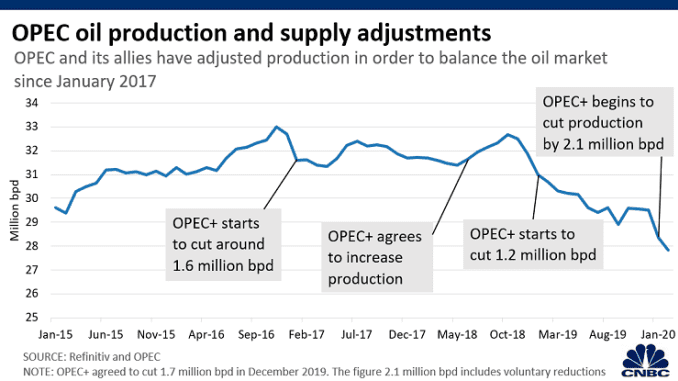Brent crude futures could plunge to “single-digit lows” if major oil producers fail to reach a deal to cut output at a time when demand has collapsed due to the coronavirus pandemic, Fitch Solutions said in a Friday report.

The Organization of the Petroleum Exporting Countries and its allies are expected to meet on Thursday — a delay from Monday — in an attempt to agree on production cuts. A previous deal by the group — commonly known as OPEC+ — expired in March after Saudi Arabia and Russia failed to reach an agreement. The fallout sent oil prices plummeting to multi-year lows.
The expiry of the deal means that producers are free to increase output this month, with Saudi Arabia, United Arab Emirates and Russia among those saying that they would do so.

Analysts from Fitch Solutions said a fall in demand and an increase in supply could result in more than 20 million barrel per day of excess oil. That would put the oil market under “extreme physical pressure,” they wrote in the report published before the OPEC+ meeting was postponed.
“While it is unlikely that nominal storage capacity will be breached, it is possible that the sheer scale of the oversupply will overwhelm global logistics chains, plunging Brent into single-digit lows,” the analysts added.
Oil futures have fallen by roughly 50% since the start of the year. On Monday, however, oil prices trimmed earlier losses after Kirill Dmitriev, the chief executive of Russia’s sovereign wealth fund, told CNBC on Monday that Moscow and Riyadh were “very close” to a deal.
Brent crude fell by around 1.7% to $33.53 a barrel, while the U.S. West Taxes Intermediate crude dipped by 2% to around $27.72 a barrel.
Oil prices to stay low
Some analysts said U.S. participation in any production cuts could improve the prospects of a deal, but the possibility of getting U.S. producers on board is low.
Thom Payne, director of consultancy Westwood Global Energy Group, said the U.S. oil industry is “fragmented.”
“So, trying to get an equitable position where they can all cut, that’s going to be very, very difficult,” he told CNBC’s “Street Signs Asia” on Monday.
Others said even if major producers — including those in the U.S. — could agree to reduce output, oil prices are likely to stay low as the coronavirus pandemic is keeping a lid on demand.
Matt Smith, director of commodity research at analytics firm ClipperData, noted that many countries are in lockdown mode as authorities seek to curb the virus spread.
“Even if we do get some type of supply cut deal, it’s a demand side issue as well,” he told CNBC’s “Squawk Box Asia” on Monday.
“Regardless of what we cut from the supply perspective, you’re going to be pushing on a string because you’re never going to be able to move enough oil off the market right now or next month to help balance things out here,” he added.
[contextly_sidebar id=”ZnLMJSggKRLHdqe9ZW1C3bzFciLcwDk8″]


